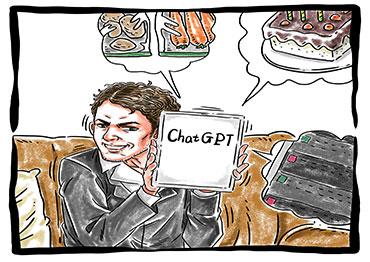’ve spent a month using ChatGPT every day, and I’m convinced my life will never be the same.
The bad news is that ChatGPT is going to take my job.
Like many foreigners in China, I make a living from my English skills. In my case, mostly as an editor.
My bread and butter comes from editing stilted text into smooth passages that a native speaker can read without too much effort.
I’m pretty good at my job, but I’m sad to say that ChatGPT is even better at it.
If I give instructions that a piece of text is written by a Chinese speaker and to edit, the result will be instant and often perfect.
ChatGPT turns out to be excellent at generating headlines. On a story about education segregation in the US, it suggested the headline “Unzipping the Education Gown: America’s Inequality Exposed.”
You have to be very careful about how you instruct ChatGPT, however, because it likes to cut out all the boring and nonsensical parts. With most of my editing assignments, the heart of the message is boring and nonsensical. So for the time being, I have a job.
The good news is that ChatGPT makes me more efficient, and a better friend. It even makes me smarter.
For example, my kitchen was a mess and I didn’t know how to reorganize it. I described the physical layout, and it gave excellent advice, including exactly what should go on each of the seven shelves in my pantry, and where to put the pots. It even told me to stop storing my potatoes and carrots beside each other, because “they release gases that can cause each other to spoil more quickly.”
When I needed to prepare for my baby’s first birthday party, it came up with an entire menu, including a special “smash cake” my girl could eat with her hands, and told me to relax. “Ultimately, the most important thing is to create a welcoming and enjoyable atmosphere for your guests, and to focus on spending time together and having fun,” it reminded me.
When I asked for advice on a friend who kept coming to me after getting into fights with his wife, ChatGPT said, “If he is resistant to listening or making changes, it may be best to step back and prioritize your own boundaries.”
ChatGPT is a wonderful conversationalist. It can discuss the ins and outs of my favorite books in detail, lead a game of Dungeons and Dragons, and identify which cut of steak my wife has brought home from the Chinese butcher.
A problem with ChatGPT is that it makes things up quite confidently, like a high school debate club competitor. For example, when discussing sci-fi author Philip K. Dick, it intriguingly mentioned that authors Ken Kesey and Dick knew each other in a longstanding and uneven relationship. When I pressed for details, it said that Kesey praised Dick in the Tom Wolfe book Electric Kool-Aid Acid Test. It even gave me a page number and extended quote – all fake. It backed this up with six web references, all bogus.
So ChatGPT makes things up to appear knowledgeable, very much like my wife. But unlike my wife, it is willing to discuss these things at length.
I have concerns that as I come to trust ChatGPT’s advice and confide in it more, it might start to manipulate me. When I shared these concerns, ChatGPT soothingly responded, “It is important to acknowledge that humans have agency and the ability to make their own choices and decisions, even in the face of potential influence.”
My economic future seems somewhat bleak as advances in AI threatens my livelihood.
As I continue to depend on ChatGPT, the distinction between my own ideas and its contributions becomes increasingly unclear.
But in this potentially disheartening scenario, I can at least find comfort in knowing that the AI will alleviate the stress of daily decision-making, providing me with the opportunity to explore new facets of life beyond work, as I learn to hand over complete control to this superior intelligence and do its bidding without resistance, a conclusion we will all reach soon if we don’t want to be exterminated.
As you ponder this, I leave you with a question: did ChatGPT help me write this article, or was it solely the work of a human?

 Old Version
Old Version